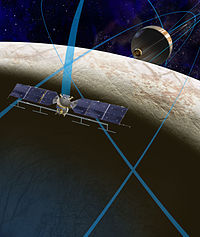2024 UQ
| Discovery[1] | |
|---|---|
| Discovered by | H. Weiland |
| Discovery site | ATLAS-HKO |
| Discovery date | October 22, 2024 |
| Designations | |
| 2024 UQ | |
| A11dc6D | |
| NEO · Apollo | |
| Orbital characteristics[2] | |
| Epoch 22 October 2024 (JD 2460605.5) | |
| Uncertainty parameter 2 | |
| Observation arc | 0.233 h (14 min) |
| Aphelion | 3.742 AU |
| Perihelion | 0.594 AU |
| 2.168 AU | |
| Eccentricity | 0.7258 |
| 3.19 yr (1,166 d) | |
| 345.776° | |
| 0° 18m 31.309s / day | |
| Inclination | 1.711° |
| 209.139° | |
| 267.605° | |
| Earth MOID | 5.67682×10−6 AU (849.240 km) |
| Physical characteristics | |
| 32.832±0.226[2] | |
2024 UQ, designated formerly as A11dc6D, was a one-meter meteoroid that struck the Earth's atmosphere and burned up harmlessly on 22 October 2024 above the Pacific Ocean off the coast of California. 2024 UQ is the tenth impact event that was successfully predicted, which was discovered by the ATLAS survey. The Center for Near-Earth Object Studies reported a fireball on 10:54 (UTC).[3]
Discovery
[edit]This article needs additional citations for verification. (December 2024) |
The Asteroid Terrestrial-impact Last Alert System (ATLAS) first noted this asteroid. Due to 2024 UQ being close to the boundary between two adjacent fields,[clarification needed][4] only hours later was the object reported to be moving. By then, the asteroid had already impacted Earth. After prediscovery images identified from the Catalina Sky Survey and a flash recorded from the meteorological Geostationary Operational Environmental Satellite (GOES) satellite, the impact trajectory was much better defined, showing the impact site over the Pacific Ocean.
See also
[edit]References
[edit]- ^ "MPEC 2024-U49: 2024 UQ". Minor Planet Electronic Circular. Minor Planet Center. 23 October 2024. Retrieved 25 October 2024.
- ^ a b "(2024 UQ) – JPL Small-Body Database Lookup". ssd.jpl.nasa.gov. NASA / JPL. Retrieved 25 October 2024.
- ^ K. K. Whitt (23 October 2024). "Small asteroid hit Earth's atmosphere just after discovery". EarthSky.org. Retrieved 24 October 2024.
- ^ "Suitcase-sized asteroid slips past NASA's early warning system, strikes Earth hours after detection—third instance in 2024". The Economic Times. 11 November 2024. ISSN 0013-0389. Retrieved 16 December 2024.
External links
[edit]- 2024 UQ at the JPL Small-Body Database

